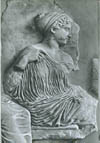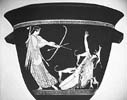- Pictures and descriptions of the four principal Olympian goddesses, including Artemis and Aphrodite, which makes clear the sort of essential associations and distinctions
- Artemis: simple garb, lives among the beasts, accompanied by nymphs (feminine divinities of the wild: streams, trees)
- Aphrodite: heavily adorned, accompanied by 3Graces (feminine divinities of feminine allure as it is enhanced by clothes, jewelry, hair-dressing)
- Artemis "shoots straight"
- Aphrodite "leads astray": Anchises because "she even led astray the mind of Zeus...": her feminine wiles are too much for Anchises, Homeric Hymn to Aphrodite, lines 97ff (Powell p. 158-9)
- Artemis as the "repression" or denial of Aphrodite (and Euripides' Hippolytus as a meditation on that)
Artemis (= Roman Diana). A virgin goddess, associated with the hunt, chastity, and childbirth (!)
Attributes: bow, fawn (or doe or stag); often appears with her brother, Apollo; usually a short dress (chiton) and a girl's hairstyle
Artemis, the maiden-who-is-desired-but-cannot-be-touched
- Associated with "virgin" nature, animals, hunt, chastity (but also
childbirth!)
- Odyssey 6 (a simile describing Nausicaa): "As Artemis the arrow-shooting
moves across the mountains, delighting in boars and swift running deer,
and with her play the nymphs, daughters of Zeus, who range in the wilds,
and Leto rejoices in her heart: Artemis holds head and forehead above them
all and is easily known, but all are beautiful: so excelling her handmaidens
shone the unbroken virgin.
Similarly there are two sides to her virginal (lack of) sexuality. Not, like Athena, a lack of sexuality: peculiarly erotic, and challenging in the erotic allure. The inviolate and inviolable virgin, usually accompanied (as in the story of Actaeon) by a swarm of equally enticing nymphs. But the appearance of Artemis' nymphs is strangely bound up in myth with rape: Zeus and Callisto, Theseus and Helen.
The image of the "Pure Virgin" is unstable: no sanctity here, but rather that destabilizing eroticism tied up with virgin girls of marriageable age. "Nymph": cf. Greek nymphe =
- (1) divinities present in streams and flowers and young trees
(2) newlywed brides
(3) young women in their first encounter with love
Aphrodite. (= Roman Venus; sometimes called Cytherea or Cypris).
Attributes: in early art, usually clothed and often impossible to distinguish from Hera or other goddesses, unless there is an inscription; from the 4th century onward, usually nude (after Praxiteles); sometimes pictured with a sceptre or a mirror; often accompanied by Eros (=Roman Cupid) or several Erotes (Cupids); sometimes accompanied by a goose or swan.
Aphrodite, the woman-who-is-desired-and-CAN-be-touched (cf. Artemis), the woman-who-is-not-the-wife (cf. Hera), woman-as-destabilizing-force (cf. Athena)
- Greek verb: aphrodizein. A. represents female
eroticism in the full bloom of beauty and without restraint, not a loss
of innocence but a mature sympathy with the frank appreciation and expression
of beauty and sexual love: "the joyous consummation of sexuality" (Burkert)
Near Eastern antecedents: Ishtar (goddess of love & war), also called Inanna and Astarte. Ritual prostitution. Sexuality, despite later representations, not solely feminine: bearded Aphrodite/Ishtar, male Aphroditos/Astar.
But as Aphrodite develops in Greek culture, clearly she is conceived as a contrast to Artemis.
- in that earlier play:
- yes, Hipp. is killed by the curse of Theseus b/c of the accusation of Phaedra that he raped her
- but no, Phaedra is not a noble woman: for Phaedra herself (and not a surrogate) actively pursues Hippolytus, supposedly in response to Theseus' infidelities; when the chaste Hipp. refuses her and threatens to tell Theseus, she in humiliation and anger accuses him first; and after Hipp's death hangs herself
- the earlier play was so offensive to the Athenians that it was voted #3 of the 3 in the contest!
- whereas the new Hippolytus (the one we have) was one of only 4 "firsts" won by Euripides in his career
- Euripides as mythmaker: essential to the play are, perhaps, Hipp.'s chastity, Theseus' revenge; but even so seemingly essential a point as whether Phaedra actively sought Hippolytus, or was trapped by the connivings of her nurse, is something the poet feels empowered to change in accordance with his purpose
- prologue: a formal prologue (here Aphrodite) that introduces the background to the action
- epilogue: the deus ex machina (here Artemis) swings down from the crane (the "machine") to "solve" the problems



